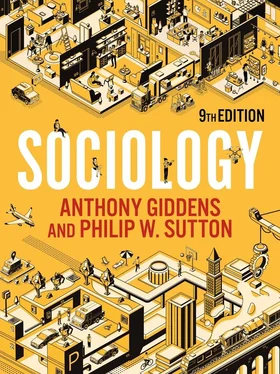Pawson’s argument applies to both natural and social sciences, though he does not accept Feyerabend’s anarchistic conclusion. Instead, he argues that methodological rules are always in a process of development, but they are not irrelevant altogether.
Second, although there is no single scientific method or methodological principle (which was sought by philosophers), science does involve certain key elements, including theoretical thinking, the logical assessment of arguments, systematic empirical investigation, rigorous analysis of data, and a commitment to publish research findings to develop a cumulative body of knowledge. This means that the social disciplines, sociology and psychology among them, must be considered scientific because both quantitative and qualitative research involves all of these elements.
However, third, we should not expect sociologists to adopt exactly the same methods of investigation as the natural sciences. This is because people, social groups and societies are, in significant ways, very different from the other animals and events in the physical world. In particular, humans are self-aware beings who confer meaning and purpose on what they do. We cannot even describe social life accurately unless we first grasp the meanings that people apply to their actions. For instance, to describe a death as a ‘suicide’ means knowing what the person in question was intending when they died. If a person steps in front of a car and is killed, objective observation may suggest suicide, but this can only be established if we know that their action was not accidental. Intention and meaning are crucial explanatory features of human action, which sociologists cannot ignore if their accounts are to be valid.

Fourth, in acknowledging this significant difference between the social and natural sciences, it may appear that sociologists are at a distinct disadvantage. Trying to ‘get inside the mind’ of an individual is notoriously problematic and seems like an additional complication. Yet there may be a major benefit. Sociologists are able to ask questions directly of those they study – other human beings – and get responses they and other researchers understand. Biologists, for instance, have no such direct communication with the animals whose behaviour they try to interpret. The opportunity to converse with research participants who can confirm or criticize the researcher’s explanations means that sociological findings are, potentially, more reliable (different researchers would arrive at the same results) and valid (the research actually measures what it is supposed to) than many in the natural sciences.
At the same time, studying human beings brings problems that do not trouble natural scientists. People who are aware that their activities are being scrutinized may alter their usual behaviour and opinions, thus invalidating the researcher’s conclusions. Participants may consciously or unconsciously manage the presentation of their self and even try to ‘assist’ the researcher by providing the responses they think are being sought. Sociologists must be aware of these problems and devise strategies to counter them. Scientists studying the behaviour of chemicals or frogs do not have to deal with this additional problem.
To conclude, we can agree with philosophers of science that there are criteria which distinguish scientific work from other types of inquiry, though these criteria are not fixed but change over time, alongside ongoing research programmes and studies. We can also agree with historians that science takes place within communities and broad theoretical frameworks or paradigms. Sociology has moved forward through competitive struggles between rival perspectives and, over time, the number of perspectives and theoretical syntheses has increased. Yet, in spite of this variety and competition, and against the anarchist position taken by Feyerabend, there remains a logic to the research process that is common across the majority of sociological studies, and this is outlined in the next section.
Determining which academic disciplines are ‘scientific’ has concerned many philosophers and historians, but does it matter? For instance, some sociologists say that ‘social studies’ better characterizes their work. List three consequences that may follow for the practice of ‘doing sociology’ within universities if sociology was not seen as a scientific discipline.
Carrying out research in sociology involves a number of steps, leading from identifying a research problem and devising a methodology right through to publishing the findings and responding to criticisms from colleagues (see figure 2.1). However, all research begins with the desire to know or better understand some aspect of the social world.
All research starts from a problem or question. This is sometimes an area of factual ignorance: we may simply wish to improve our knowledge about certain institutions, social processes or cultures. A researcher might set out to answer questions such as ‘What proportion of the population today holds strong religious beliefs?’ or ‘How far does the economic position of women still lag behind that of men?’ Such questions are necessary and useful.
However, the best sociological research begins with problems that are also puzzles. A puzzle is not just a lack of information but a gap in our understanding . Much of the skill in producing worthwhile sociological research consists in correctly identifying puzzles. Rather than simply answering the question ‘What is going on here?’, puzzle-solving research tries to contribute to our understanding of why events happen as they do. Thus we might ask: ‘What accounts for the decline in the proportion of the population voting in elections in recent years?’ ‘Why are women poorly represented in high-status jobs?’ These questions are not simple factual questions but require us to go a stage further to provide explanations for the evidence we find.
It is important to remember that no piece of research stands alone. Research problems arise as part of ongoing work, and one research project may easily lead to another because it raises issues the researcher had not previously considered. A sociologist may also discover puzzles by reading the work of other researchers in books and professional journals or by being aware of trends in society.
Reviewing existing evidence
Once the problem is identified, the next step is usually to review the available evidence in a particular field through a review of the existing literature. It could be that previous research has already satisfactorily answered our question and there is no need to repeat the process. But, if not, the sociologist will need to sift through whatever research does exist to see how useful it is for their purpose. Have previous researchers spotted the same puzzle? How have they tried to solve it? What aspects of the problem have their studies left unanalysed? Drawing upon others’ ideas helps the sociologist to clarify the issues that might be raised and the methods that might be used in their own research. Reviewing the literature is an essential step that helps to avoid unnecessary duplication and repetition, and it can also point out where gaps in our knowledge still exist.
Making the problem precise
A third stage involves working out a clear formulation of the problem. If relevant literature already exists, the researcher might return from the library with a good idea of how the problem should be approached. Hunches about the nature of the problem can sometimes be turned into research questions, which, though rooted in an educated guess about what is going on, clearly state this in precise language. If the study is to be effective, research questions must be formulated in such a way that the empirical material gathered will provide evidence that either supports or challenges them. Studies involving the collection and analysis of numerical data, such as social surveys, tend to favour statistical testing as a method of verifying or falsifying clearly stated hypotheses, while qualitative research will often be exploratory in character and allow research questions to emerge during the research process.
Читать дальше













